塑料粉末静电喷涂生产线设计(含CAD图)(任务书,外文翻译,论文说明书10000字,CAD图纸14张合一)
摘要
塑料粉末静电喷涂工艺在世界上已经被广泛地用于金属制品的表面防腐和装饰,在我国属于“七五”期间的重点推广的新工艺。单体液压支柱油缸一般采用的是外表面喷漆达到防腐和装饰的目的。但是由于喷漆既浪费能源又造成社会公害,还存在发生火灾的可能性,同时工艺也比较复杂,生产效率低满足不了生产的发展,为改善上述状况,应用新的技术,决定采用塑料粉末静电喷涂这种工艺,上一条生产线解决单体支柱油缸外表面的装饰问题。采用静电喷涂生产线可以有效的提高静电喷涂的效率,节约大量的工时。同时生产线现广泛用于生产车间,将各个分散的工序通过生产线这个媒介而组合在一起,使得生产得以集中化,便于管理和生产,这也是生产效率提高的主要原因。塑料粉末静电喷涂生产线可以循环式生产操作,从而使工人的生产操作流线化,降低工作强度,使得艰苦的工作可以轻松的完成。
关键字:静电喷涂生产线 滚子链 链轮 机械传动
Abstract
The plastics powder static electricity sprays to draw the craft at have been used for the surface antisepsis that metals product broadly with decorate in the world, belong to the new craft that the point of the period in "7 5" expand at the our country.The single body fluid presses a the pillar oil urn adopts now of is an outward appearance to spray the paint attain the antisepsis with the decorative purpose.But because of spraying the paint since the wasted energy results in the social harmful effects again, still exsits the possibility of the occurrence a fire, the craft is more complicated at the same time too, produce the efficiency is low satisfy not the development of the production, for improving the above condition, apply the new technique, decide to adopt the plastics powder static electricity sprays to draw this kind of craft, last a production line solution single a pillar oil an outside and superficial adornment problem.The adoption static electricity sprays to draw production line can effectively of the static electricity of exaltation sprays the efficiency that draw, economizing a flood of man-hour.The production line is extensive now to used for at the same time the production car a work for, will eachly asunder preface passes production line this medium and the combination is together, making produce can concentration turns, easy to management with produce, this is also a main reason to produce efficiency increases.The plastics powder static electricity sprays to draw production line can then the circulate type produces the operation, from but make the worker's production the operation flows the line turns, lowering the work strength, canning make hard work completed relaxedly.
Key word:The production line of the static electricity sprays to draw Roll chain Chain round The machine spreads to move
1.3、总体方案的确定
(1)确定喷涂线速度:根据喷涂要求,没喷涂一根DZ25型油缸需时60秒几喷室进风口宽度所限确定线运行速度为0.33m/80s。
(2)固化炉:1)长度:根据粉末固化时间30分钟,外加工件预热15分钟,总是需45分钟。共需炉长12米,为减少炉所需功率采用工件在炉内循环式,炉长8米。
2)加热方式:采用远红外管加热。
3)保温方式:采用硅酸铝耐火保温材料。
(3)喷室:用ó=3mm钢板焊接
(4)清洗:喷淋清洗和擦洗相结合
(5)减速器:采用大速比双级涡轮减速器,速比:u=5800
(6)涨紧:采用小车配重砣涨紧法。(见图一)
2.1 静电喷涂生产线的组成
静电喷涂生产线的主要结构包括:喷淋室、喷室、固化炉、涨紧部分、减速器平台、导轨、链传动装置、吊物装置等组成。
2.2 静电喷涂生产线的技术参数
1、传动链传动速度为0.375m/min.
2、减速机速比为1/5133(87*59)
3、加热管每根功率为2kw,共45根为90kw。
5、静电喷涂生产线总功率为122kw。
固化炉: 118kw;
减速机电机:4kw;
6、喷涂线总长度25000mm;
总宽度 5000mm;
总高度 2500mm(导轨与地面高度)
展开长度 56000mm。
7、喷涂油缸范围 DZ06-DZ25型
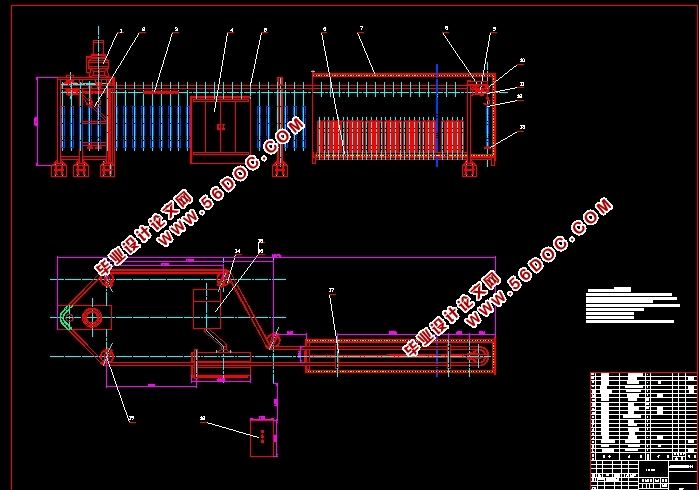
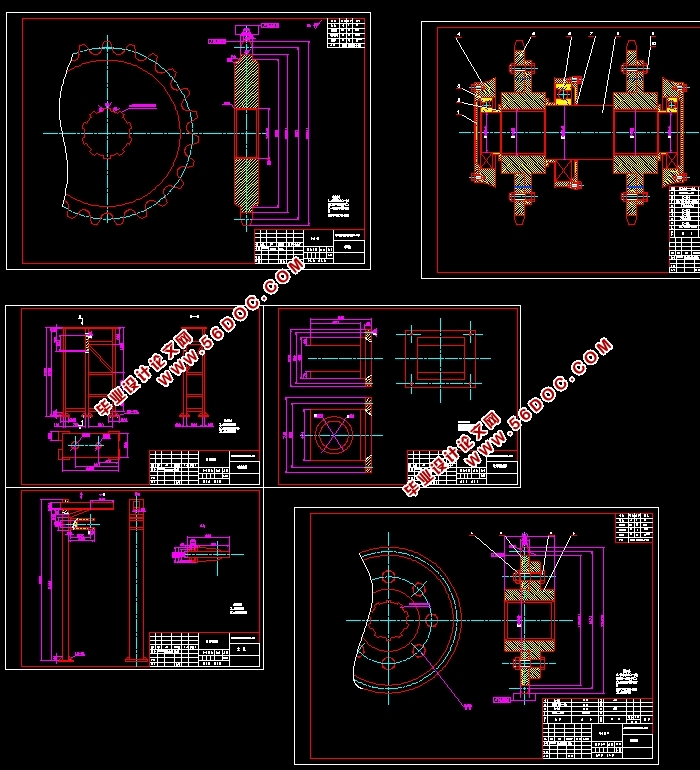
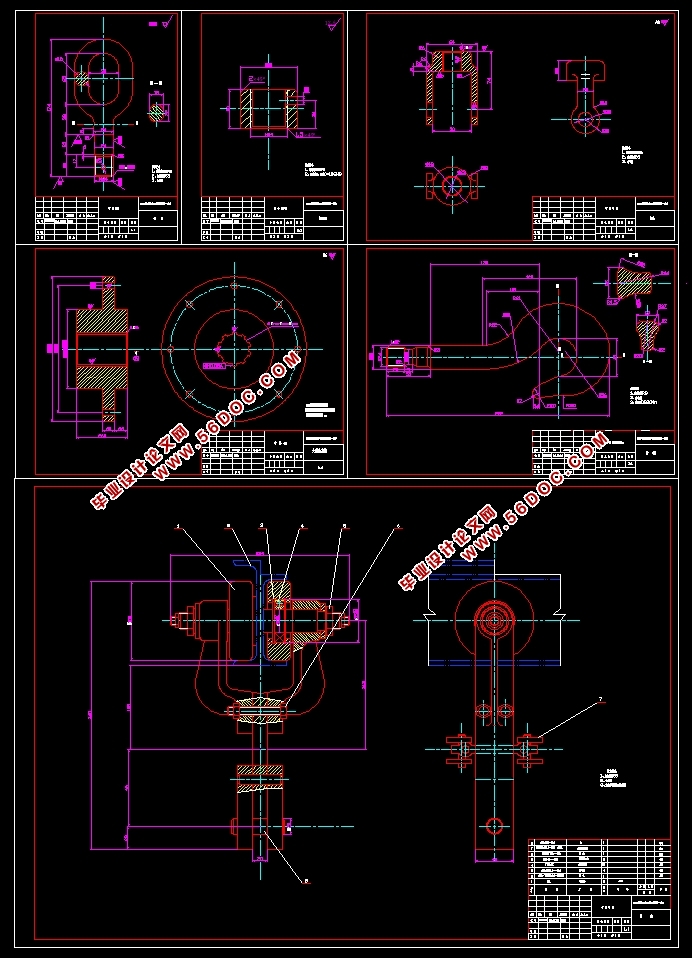
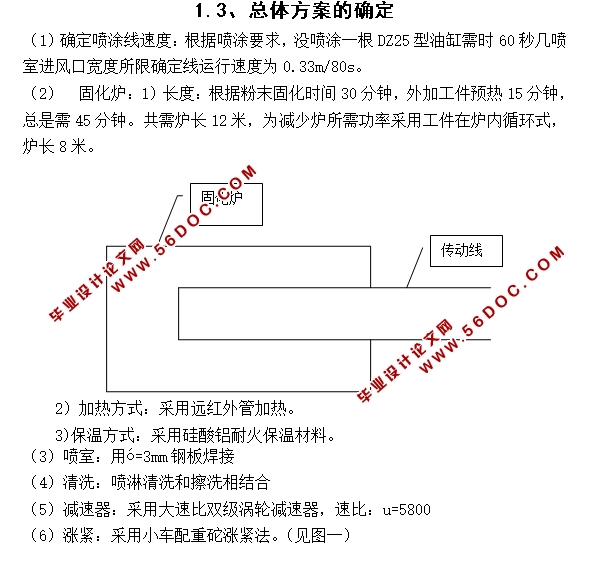
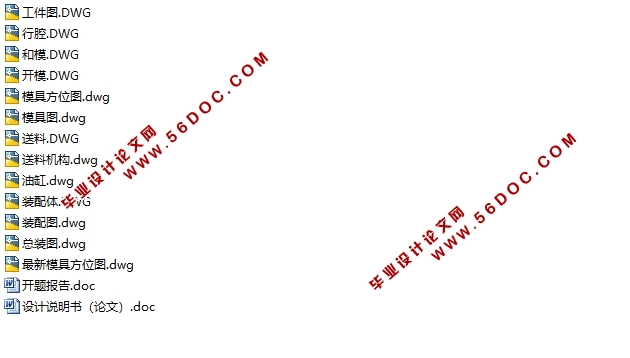
目录
摘要………………………………………………………………………………Ⅰ
Abstract……………………………………………………………………… Ⅱ
第1章 绪论…………………………………………………………………… 1
1.1 、塑料粉末静电喷涂线的概述……………………………………… 1
1.2 、静电喷涂的发展与应用…………………………………………… 1
1.3、总体方案的确定…………………………………………………… 2
第2章 静电喷涂生产线的特性……………………………………………… 5
2.1 静电喷涂生产线的组成……………………………………………… 5
2.2 静电喷涂生产线的技术参数………………………………………… 5
2.3、技术要求…………………………………………………………… 5
第3章 机械系统传动设计…………………………………………………… 6
3.1 前言:链传动的特点与应用………………………………………… 6
3.2 滚子链传动的设计…………………………………………………… 6
3.2.1 滚子链传动选择指导…………………………………………… 6
3.2.2 滚子链的传动设计计算 ……………………………………… 6
3.2.3、滚子链的静强度计算………………………………………… 11
3.2.4、滚子链的耐疲劳工作能力计算……………………………… 12
3.2.5、滚子链的耐磨损工作能力计算……………………………… 13
3.2.6、滚子链的抗胶合能力计算…………………………………… 14
3.3、滚子链链轮设计…………………………………………………… 15
3.3.1基本参数……………………………………………………… 15
3.3.2 、主要尺寸的确定…………………………………………… 15
3.3.3、齿槽形状……………………………………………………… 17
3.3.4、轴向齿廓及尺寸……………………………………………… 19
3.3.5、材料及热处理………………………………………………… 20
3.3.6、链轮公差……………………………………………………… 20
3.4、电动机的选用……………………………………………………… 21
第4章、塑料粉末静电喷涂线使用说明书………………………………… 22
4.1、塑料粉末静电喷涂工操作技术要求……………………………… 22
4.1.1、准备工作…………………………………………………… 22
4.1.2、开机操作…………………………………………………… 22
4.1.3、维护…………………………………………………………… 23
4.1.4、安全注意事项……………………………………………………23
4.2、塑料粉末静电喷涂线的使用与维护………………………………… 24
4.2.1、使用准备工作……………………………………………………24
4.2.2、开机工作…………………………………………………………24
4.2.3、维护………………………………………………………………24
4.2.4、安全注意事项……………………………………………………24
第5章、经济性分析
5.1、经济效益……………………………………………………………… 25
5.1.1、节约材料费………………………………………………………25
5.1.2、节约工时费………………………………………………………25
5.2、社会效益……………………………………………………………… 25
结论……………………………………………………………………………… 27
致谢……………………………………………………………………………… 28
参考文献………………………………………………………………………… 29
专题……………………………………………………………………………… 30
附录(一)……………………………………………………………………… 43
附录(二)……………………………………………………………………… 50
|











